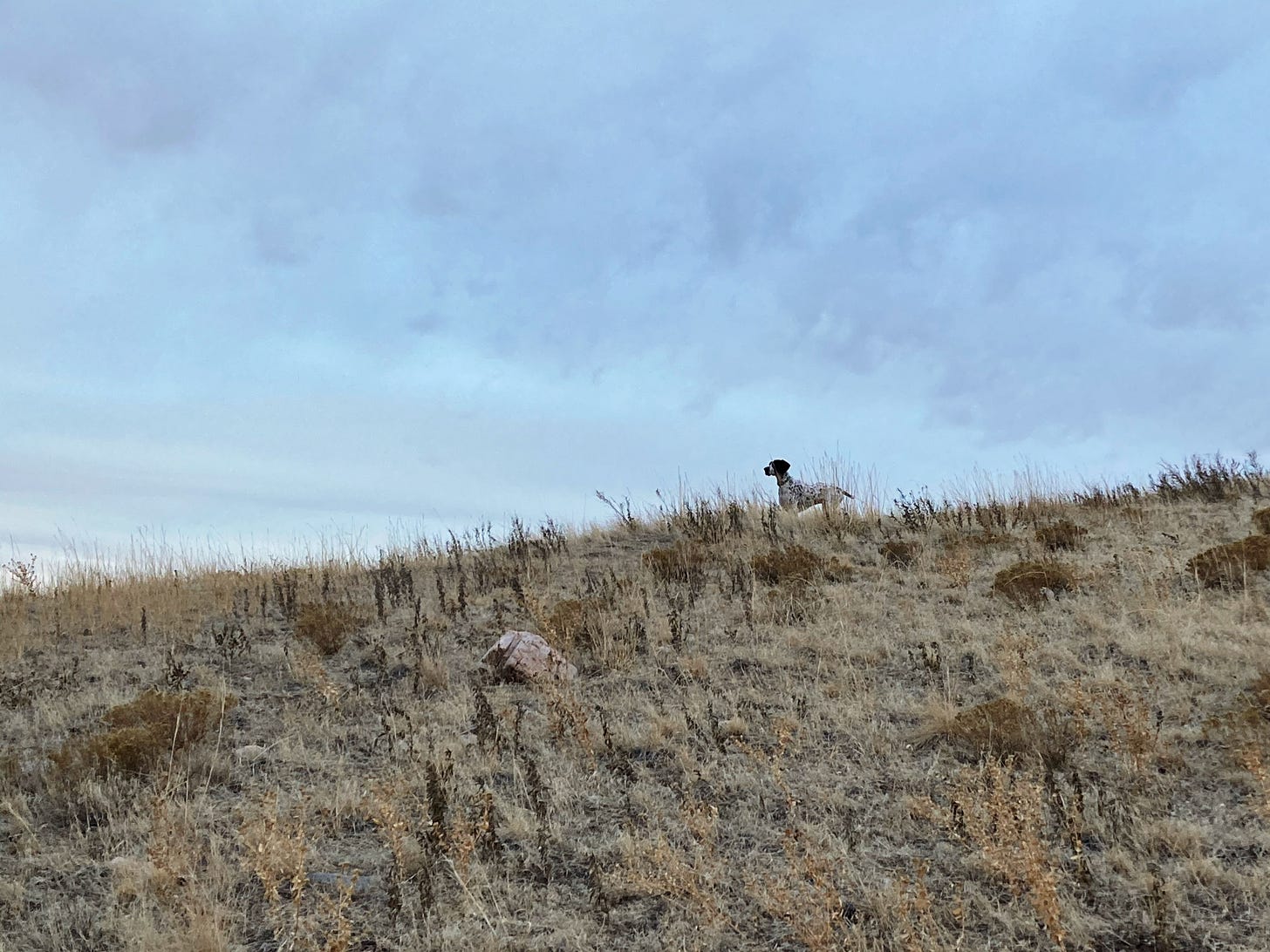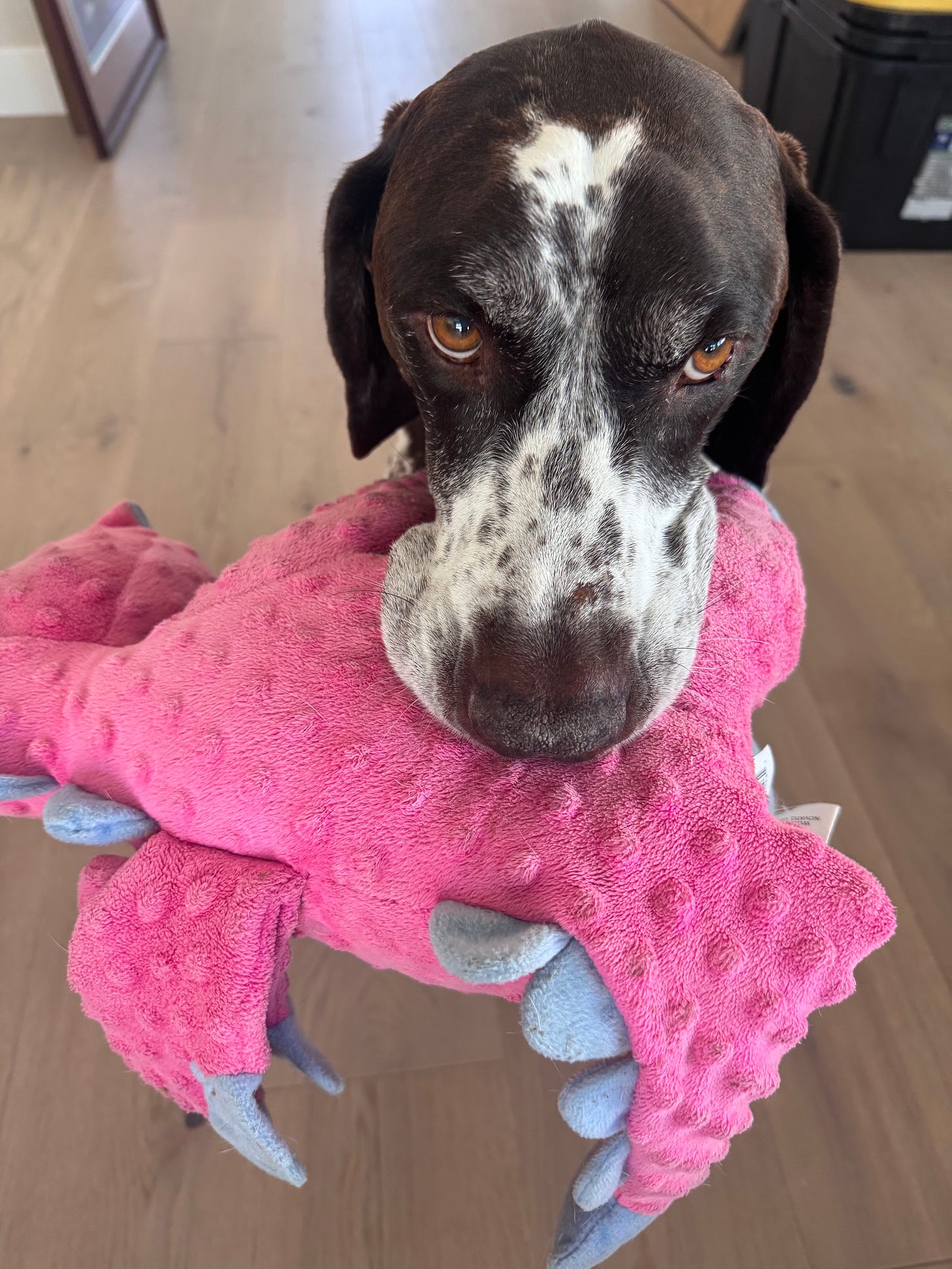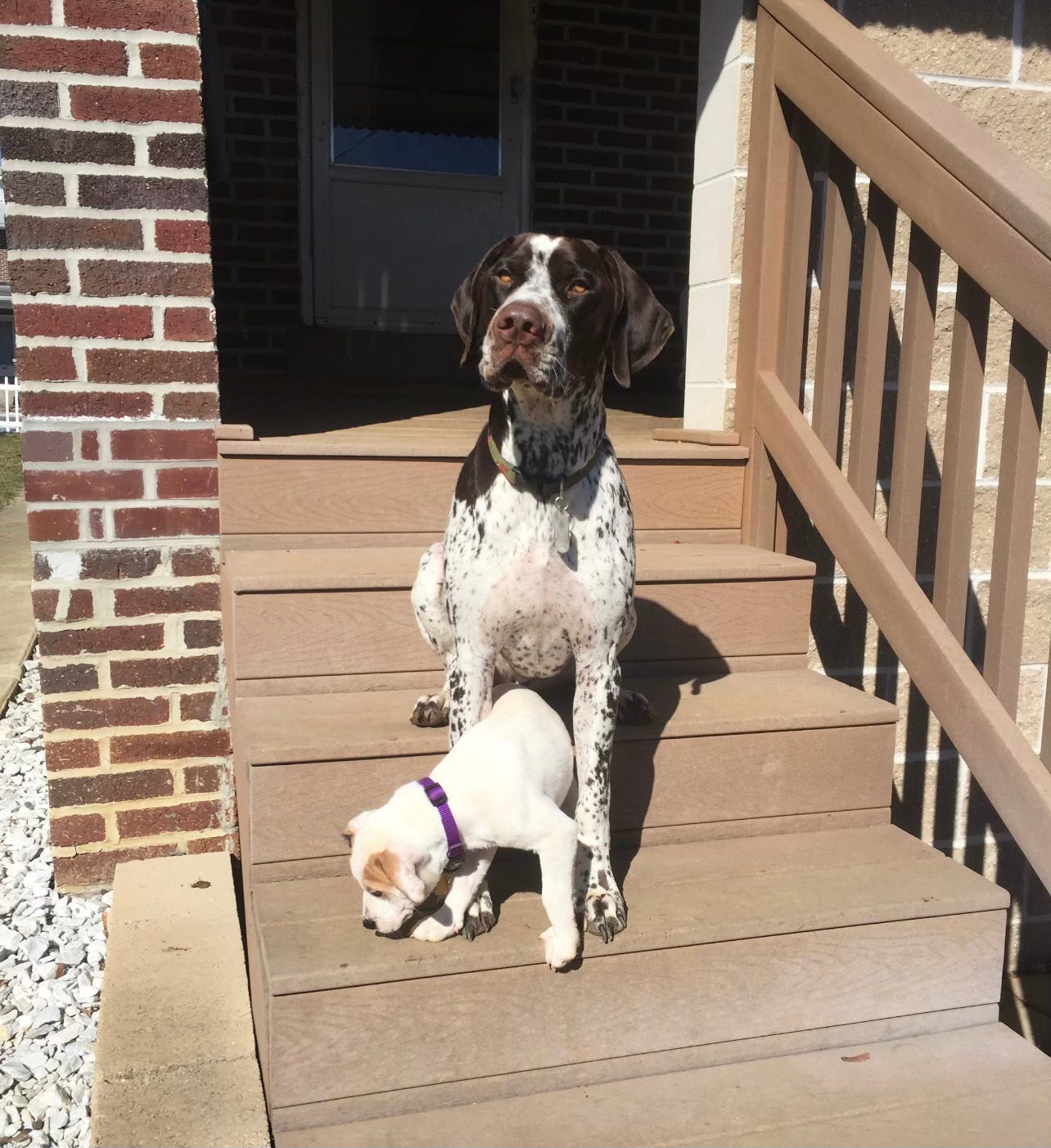Long live Stockton
Lessons from the dog that saved my life
Housekeeping
This post, like all Monday posts, is free to all subscribers. Check out a Membership, which gets you full access to all three of our weekly posts:
ICYMI:
On Wednesday, we covered how much weight you should ruck with if you’re overweight, and the rules for rucking weights.
On Friday, we partnered with MTNTOUGH for an awesome ruck Burn the Ships workout.
The post
Well, Two Percent community, I hate to be the bearer of bad news, but we had to say goodbye to Stockton last week.
Stockton’s been a fixture of Two Percent since its inception three years ago. He spent 11 years on an adventure with us, and now he’s onto his next one.
I found Stockton a month after I got sober. I needed something, anything, that would get me out of myself.
“I got a dog,” I told a sober friend who’d been helping me navigate life without alcohol. “Well, you should have run that past me first,” he replied. “But you’re committed now. Maybe he’ll help you.”
That dog did more than help me. Truly, he saved my life. He gave me a routine that pulled me out of feeling sorry for myself and thinking about alcohol. I grew alongside him and never relapsed because I had a reason not to: I had to take care of Stockton.
Stockton was at my side during every word I’ve written over the last decade, and we went on some incredible adventures together. He was the perfect gentleman and loved everyone, especially me, his mom, and his sister, Conway. He loved our runs in the desert, stealing people food, and watching The Sopranos on the couch with us.
Leah and I have spent the last days grieving, recounting infinite Stockton stories, and considering what he taught us. He taught us both so much.
We’re not alone. When I posted about Stockton’s passing on Instagram, I received a mind-boggling amount of messages from people who told me a dog had changed their life and taught them so much, too.
Here’s a short list of what Leah and I learned from Stockton.
More will be revealed
I planned to find a 30-pound, relaxed, female dog. But when I went to look at puppies, I met a male German Shorthaired Pointer. His body was tiny, but his paws were already the size of mitts and wrists as thick as Leah’s. He’d be available in a few weeks.
When I picked Stockton up from the Pennsylvania countryside, he sat in my lap, biting and pawing at the zipper pull on my vest the entire hour-long drive home.
Stockton grew to 85 pounds. As a hunting breed, he was perfectly nuts—requiring plenty of exercise and attention.
Stockton wasn’t at all what I planned, but he was exactly what I needed.
And maybe that worked both ways. When Stockton was two years old, he had his first seizure—a grand mal where he lost all control of his body and writhed for half a minute. It was the scariest, saddest thing I’d ever seen—to watch an innocent, sweet animal suffer so deeply and come out of it terrified and clinging to me for help.
But in sobriety, I finally had a small savings and the selflessness to spend it on something other than myself. I took him to a neurologist. “Without treatments,” she said, “he’ll probably die.” She prescribed him medication that Leah and I could hardly afford back then, but I picked up remote freelance jobs to cover it.
Who knows what would have happened had ended up with another family. I felt like we’d saved his life, too.
A phrase often repeated in recovery groups is “more will be revealed.” It summarizes a sentiment in a recovery book that states, “We realize we know only a little. God will constantly disclose more to you and to us.”
It gets to the idea that life rarely unfolds as we plan—it unfolds as it should. And in retrospect, what happens is often exactly what we need.
Don’t take yourself too seriously
When I first got Stockton, my history of uncontrollable drinking had given me a habit of trying to expertly control everything else in my life. Attempting to control things gave me the illusion that all was OK.
When I got sober, I still had that control flaw. Before I got Stockton, I researched the perfect training methods, the perfect puppy diet, etc.
The first night he came home, Leah left Chinese takeout on the coffee table—and Stockton wolfed down half of it in all of its greasy, MSG-laden glory. I was totally annoyed.
But the more time I spent with Stockton, the more I realized:
Control is an illusion. Dogs are going to do ridiculous dog things. Other humans are going to do ridiculous human things. We can’t change it.
Control kills the joy and fun in life.
Some of our most frustrating moments in life, in hindsight, often turn out to be the things we laugh about the most.
Stockton helped me realize the best I can do is my best—and laugh when things go completely off the rails (as they usually do). Which is to say, he helped me learn not to take myself too seriously.
Like when I’d be in important video meetings and he’d walk into my office with a giant, pink stuffed dragon toy in his mouth, jump up on my lap, and shove the dragon in my face on video.
How could I not laugh at that? That’s the good stuff I’ll remember—not the meeting.
Change what you can
As a puppy, Stockton had many interests: knocking refrigerator magnets off the fridge, chewing on crown molding (?), and smashing my cellphone with his paws. He never got over his habit of counter surfing. Truly, he was the Laird Hamilton of counter surfing.
In sobriety, we learn to “accept the things you cannot change and change the things you can.” Quips like that give us an intellectual understanding of the idea. But Stockton gave me plenty of experiential understanding of the idea, and experience is the best teacher.
He showed me there’s no point in getting worked up over stuff you can’t change. If I didn’t catch him in the act of an escapade, there was no point in correcting him. What was I going to say? “Hey, about three hours ago you knocked the magnets off the fridge and I’d appreciate it if you would cease to …”
The famed behavioral psychologist and training expert Karen Pryor notes that positive reinforcement is the most powerful teacher. But they only work when delivered immediately.
Whether we’re working with dogs, kids, or ourselves, it’s far better to positively reinforce good behaviors right as they occur. That’s the ultimate growth stimulus.
She also notes that punishment—negatively reinforcing a behavior long after it’s occurred—on average doesn’t work. If you can’t correct a bad thing immediately, let it go.
Help others
We got Conway a year after Stockton. Stockton was long and lean. Conway is built like a brick.
When she was a puppy, Conway couldn’t figure out how to go down our back porch stairs to reach the lawn. Leah and I tried and tried to teach her. It never worked. So I’d have to pick her up and chauffeur her down so she could go potty and play.
One day, we were sitting on the back porch, and Stockton grabbed a stuffed trout toy that Conway loved. She grabbed the other end in her mouth. Stockton held it and slowly walked to the stairs and went down the first step. Conway used the trout to balance and go down the first step. Then Stockton went down another, and Conway followed. And so on until Conway had walked down the stairs. Then he repeated it. After a couple of rounds, Conway was going up and down the stairs with no problem.
Leah and I sat in awe.
Of course, he also helped Leah and me. “He was just a very comforting guy,” Leah said. When she’d have a bad day, he had an amazing way of picking that up and being there to snuggle. He was a professional snuggler.
Recently, psychologists at UCLA1 pointed out that “modern society often places a greater emphasis on self-focused acts in the pursuit of well-being.”
But after examining the literature, they discovered that being kind and helping others boosts mental health more than seeking joy for yourself.
If you feel down or want to ensure you’ll feel good for the long run, focus less on yourself and more on helping others.
Take care of yourself
If I had a dollar for every time someone said, “That is a handsome dog,” I could have almost afforded Stockton’s vet bills (he liked to run into things outside, and his frequent counter surfs led him to the emergency vet on a few occasions).
He was the George Clooney of dogs. And he knew it—he was always cleaning and taking care of himself.
Stockton proved to me that things that things that look nice and well-kept get more attention—be it art, humans, possessions, homes, dogs, etc.
Take care of yourself and your things. Dress well. Put pride into what you put forth. As my friend JC Winter, AKA the Wolf of Walmart, says, “dressing well is the best revenge.”
Find your happy place
Stockton and I ran together in the desert often. These desert runs were his happy place.
When I hiked the Hayduke Trail with my friend Matt, we talked about how the combination of hiking and navigating presented a physical and mental challenge simultaneously. It was exhausting but totally rewarding, leaving us calm and free of want.
“This is going to sound weird,” I told Matt after we’d just navigated a canyon. “But it’s like my dog, Stockton. He’s a hunting dog—he was bred to physically work while using his brain to navigate and locate birds and animals. I can walk or run him on the sidewalk for hours, and he’ll still be restless when we get home. But when I take him into the desert and let him off-leash, he completely changes. You can watch his mental gears turn. The shape of his body even changes. He sweeps and scans and searches for animals. And when he finds one, the chase becomes an epic physical chess match. He thinks. He works. And he’s content—an hour of that tires him out more than any distance of a leashed walk or run through the neighborhood.”
“We think we’re different from dogs,” Matt said. “But I’m not so sure.”
We often think mental health is internal and in our heads—determined by mysterious chemicals. But chemical theories of depression and anxiety are currently falling apart.
But I believe our mindset is more external—it’s at our feet and in our hands and how we use them. If we can find activities that give us purpose, we touch a note deep inside that leads to long-term satisfaction.
Go out on a high note
Two months ago, Stockton developed a mild cough. We thought he had allergies. But it worsened over the course of a week, so I took him to the vet, figuring he had the flu.
“I have some bad news,” the vet said. Lung scans showed Stockton had many tumors, a result of cancer that had started elsewhere and spread throughout his body. “He’s got one to two months.”
Leah and I were devastated. We wanted to keep him around forever. But we also realized this wasn’t about us. It was about Stockton.
Given how the cancer had spread, invasive treatments had low odds of working. We found an oncologist vet and told him we only wanted treatments that improved Stockton’s quality of life.
“He’ll let us know when he’s ready,” Leah said.
Last Saturday, Stockton stopped eating. “If this food-loving dog isn’t eating, that’s our sign,” Leah said. By Monday, right before a hospice vet came to our home, he’d stopped drinking. But he was still happy, tail occasionally wagging—and that’s how he left us.
We often don’t take the same approach with people.
In his incredible book Being Mortal2, Dr. Atul Gawande points out that modern medicine is great at prolonging life—but that often undermines what we really value in our final days. Autonomy, dignity, relationships, and the ability to have a good day are set aside to stay alive at all costs. We use aggressive treatments that lead us to suffer and don’t improve our lives, but instead just lead us to die later.
His argument is that we should replace the default “fight-everything” end-of-life medicine with early and honest conversations, care that aligns with our goals, and living environments that preserve our agency. That’s what most people value, and the best evidence shows this approach usually leads to better quality of life and, sometimes, a longer life.
When my time comes—and it will soon—I hope I remember Stockton and make decisions that lead me to go out happy, tail wagging.
Have fun, don’t die, long live Stockton,
-Michael
Thanks to our partners
Jaspr air purifiers
Air quality is a massively overlooked health metric. I consider Jaspr my #1 home health tool. Most health-promoting things require effort—but Jaspr is an exception. Just plug it in and remember to breathe. Get a discount through this link.
GOREWEAR
I’ll be using the hell out of GOREWEAR gear on the trails this fall. The CONCURVE WINDSTOPPER insulated jacket is perfect for chilly fall hikes and runs. Check it out. EASTER gets you 30% off your first GOREWEAR purchase. It’s pure Gear Not Stuff.
Maui Nui
Maui Nui harvests the healthiest protein on planet earth: wild (and invasive) axis deer on Maui. The nutritional value of axis deer is incredible. My go-to: The 90/10 stick. Head to mauinuivenison.com/lp/EASTER to secure access.
Naclerio, M., Lazar, L., Hornstein, E. A., & Eisenberger, N. I. (2025). Exploring the effects of prosocial and self-kindness interventions on mental health outcomes. Emotion.
Gawande, A. (2014). Being mortal: Medicine and what matters in the end. Metropolitan Books.






Losing a dog friend like this is so difficult. But what a gift to have had Stockton for 11 years. RIP Stockton.
What a perfect tribute to a good boy. I didn’t not expect to cry today, but thank you for sharing!